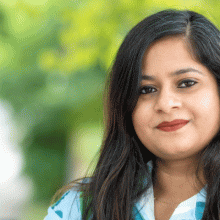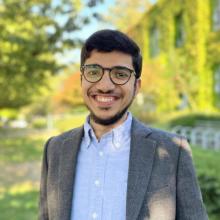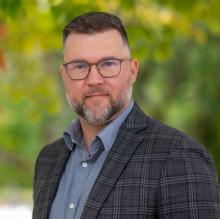Researchers work on preeclampsia - a pregnancy complication - thanks primarily to the donations and contributions of pregnant individuals. But results and advances rarely reach back to these individuals, not for many years. Icíar's work on the placenta and preeclampsia involves science communication to fully engage this community, create foundations of trust and dialogue with them, and give back to the community.
Research Description
The placenta is a temporary organ that nourishes and protects the growing baby, and facilitates transport of nutrients and oxygen by invading maternal arteries to establish blood supply. Abnormalities in the development of the placenta can lead to preeclampsia, a pregnancy complication characterized by maternal hypertension that affects 2-8% of women worldwide and increases the risk of dangerous outcomes for both mother and child. Preeclampsia is a highly heterogeneous condition that occurs in a spectrum of severity and is only resolved after delivery of the baby. In addition, the biological sex of the child, and thus of the placenta, plays a role in development and pregnancy outcomes, with evidence that female sex increases the risk for PE with preterm birth. In my doctoral thesis work, I am leading two studies to elucidate some aspects of this complex disorder in the organ where it has its origin: first, to characterize molecular subtypes of preeclampsia that can pave the path to a more complete classification of this disorder, and second, to investigate how biological sex affects preeclampsia. The ability to define molecular subtypes of preeclampsia and understand how biological sex affects this disorder will facilitate future studies of this disorder and potentially inform clinical practice. Advances in the understanding and treatment of pregnancy complications are only possible thanks to the generous donation of placentas from pregnant individuals, yet research findings are primarily shared to the research community. Pregnant individuals may have an interest in learning about how placental research improves maternal and child health, and could benefit from understanding its clinical importance. By creating a website with accessible educational resources to learn about the placenta, I hope to engage this community and set a foundation for trust and involvement of pregnant individuals in this research field.
What does being a Public Scholar mean to you?
Being a Public Scholar means having the opportunity to take research findings beyond the lab bench to share them with pregnant women, who make placental research possible.
In what ways do you think the PhD experience can be re-imagined with the Public Scholars Initiative?
The PSI allows for doctoral research work to create a positive impact in the community in a direct way. Although academia is evolving, the way in which we share our work is typically limited to peers in our same discipline; by belonging to this network, we cross bridges that we normally wouldn't, have the opportunity to translate our research in a wider variety of formats beyond traditional publications, and are challenged to step out of our comfort zones. While the importance of knowledge translation is becoming increasingly recognized by scientists, this work is often conducted in the sidelines and considered as secondary in importance to the pursuit of research. Metrics of scientific success generally revolve around publication prestige (i.e., number, impact factor…); however, we must reframe what we think of as scientific excellence by elevating non-traditional skills such as communication and empathy to the same level of importance. For instance, knowledge translation plans have become a requirement of many funding agencies, yet there is minimal training offered in this area as part of our education. Incorporating this project as part of my doctoral thesis recognizes knowledge translation as a fundamental component to our training as emerging scientists, and demonstrates that it is scholarly work that complements an otherwise traditional research thesis in the sciences.
How do you envision connecting your PhD work with broader career possibilities?
Carrying out a science communication project where I learn how to translate research findings for the public will provide me with the skills to continue to share future work in other formats beyond traditional mediums, and with the experience to collaborate with individuals from other disciplines outside of my own. While I am interested in pursuing a career in academia, I would like community engagement in research and knowledge translation to remain a central part of my work, and I believe that completing this project will give me the insight to do so.
How does your research engage with the larger community and social partners?
As part of my project, I will be surveying pregnant individuals about their knowledge and specific interests in learning about the placenta, such that the educational resources that I will create will be tailored to their interests. In addition, following the release of the website, I will engage with the initial survey respondents again for feedback that will be acted upon by modifying content on the website whenever possible.
Why did you decide to pursue a graduate degree?
During my undergraduate degree, I was constantly curious to ask questions beyond the content of lectures and textbooks, and when I had the opportunity to pursue a small research project for my thesis I enjoyed working in a lab and being able to answer fundamental questions with data. In particular, I was fascinated by genetics and I knew that I wanted to further explore that field.
Why did you choose to come to British Columbia and study at UBC?
I have a passion for travelling and discovering new places, I had previously visited Canada several times before and knew that it was a place where I could see myself living. I enjoy big cities and Vancouver seemed to have the perfect mix of city living, with mountains and the ocean a short drive away. UBC has plenty of opportunities not only for research, but also as an international student.




